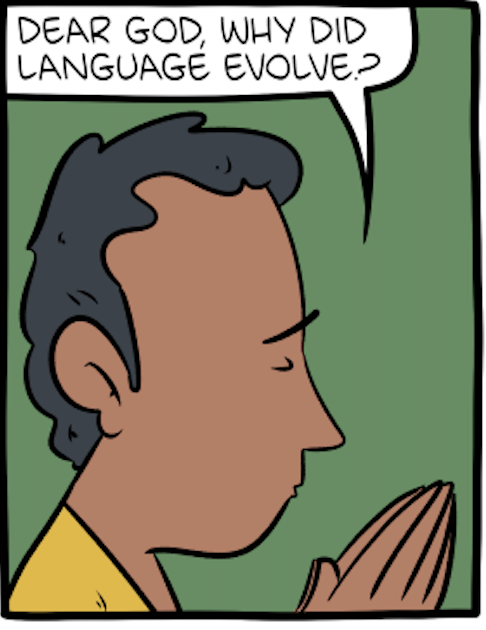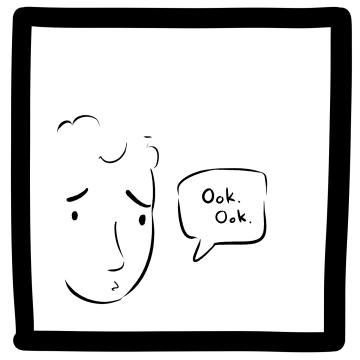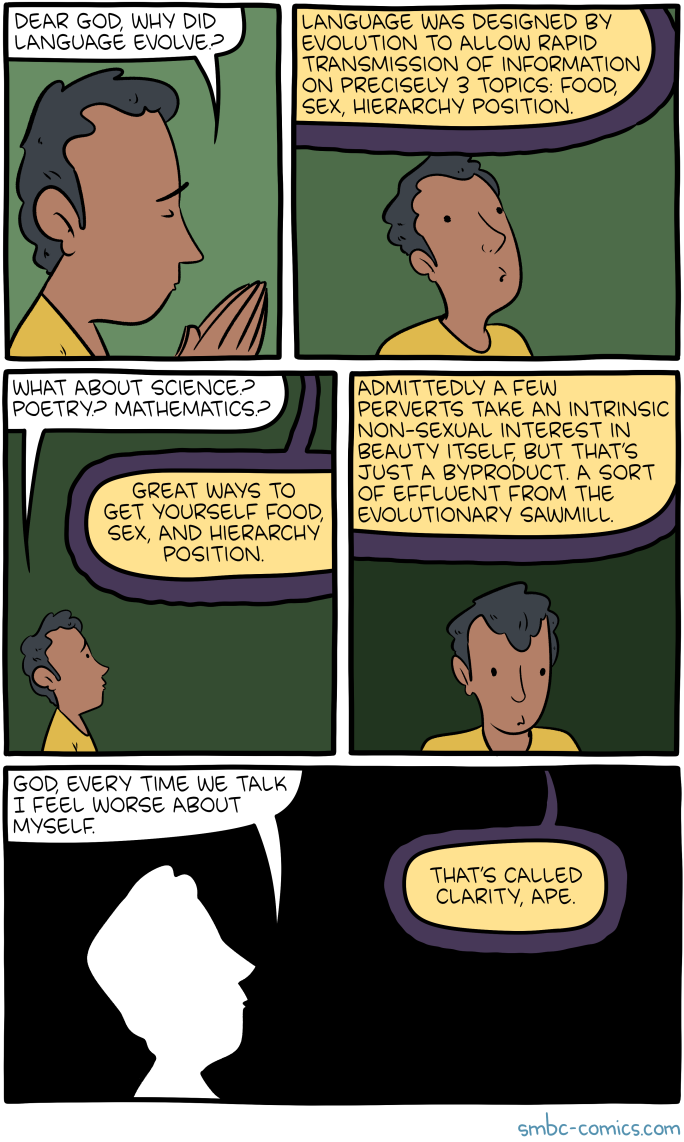Language Evolution
« previous post | next post »
Today's SMBC starts this way:

The mouseover title: "Please share this comic to increase your hierarchy status."
The aftercomic:

These Lecture Notes for ling001 have some discussion of various perspectives on this question.
An exchange between Tecumseh Fitch and Derek Bickerton on the topic:
"Musical protolanguage: Darwin's theory of language evolution revisited", 2/12/2009
"Bickerton on Fitch", 2/15/2009
"'Silence on the Savannah!' On Bickerton's Yodeling Australopithecines and Missing the Point of Musical Protolanguage", 2/20/2009
Some earlier background on Bickerton's own theory: "A new theory about the evolution of language", 6/11/2005.
And relevant to Darwin's idea — Julia Hyland Bruno, Erich D. Jarvis, Mark Liberman, and Ofer Tchernichovski, "Birdsong Learning and Culture: Analogies with Human Spoken Language", Annual Review of Linguistics 2021.

Philip Taylor said,
January 31, 2021 @ 10:53 am
"Language was designed by evolution" ?! Surely God does not indulge in teleology, does He ?
[(myl) On many accounts She does: the "Watchmaker analogy"
…is a teleological argument which states, by way of an analogy, that a design implies a designer, especially intelligent design an intelligent designer, i.e. a creator deity. The analogy has played a prominent role in natural theology and the "argument from design," where it was used to support arguments for the existence of God and for the intelligent design of the universe, in both Christianity and Deism.
]
S Frankel said,
January 31, 2021 @ 11:24 am
God is the only one Who *can* indulge in teleology, right?
Chester Draws said,
January 31, 2021 @ 3:32 pm
Odd, I would have thought safety was the highest priority. Like the meerkats differentiating ground-based to air-based threats.
Tim Rowe said,
February 1, 2021 @ 1:47 am
"Safety as a highest priority" is one *possible* strategy. Another common strategy is to have so many offspring that safety doesn't matter much. I'm working on the latter strategy, but struggling to find enough collaborators.
KeithB said,
February 1, 2021 @ 9:32 am
Heredity, mutation and natural selection *is* a design process. In fact it is often used as an option in optimizers.
Xan said,
February 1, 2021 @ 11:36 am
@ChesterDraws
Safety can probably be included, at least partially, within the single topic “food”:
Food a) getting enough of it
Food b) avoiding to become it
Orin K Hargraves said,
February 1, 2021 @ 11:48 am
"As the firſt language, whatever it was, muſt therefore have been perfect; and liable to no
depravation from a mixture of foreign idioms; and held in reverence by thoſe who ſpoke it,
that is, by all mankind, on account of its divine original . . ." –James Beattie, The Theory of Language in Two Parts, 1783.
JPL said,
February 3, 2021 @ 2:29 am
The opening statement in the lecture notes, for Ling 101: A biological perspective, might strike some readers as oddly phrased; but the oddness in the phrasing is just what puts the statement on the right track for pursuing the overall guiding question, "Where did human language come from?" Because, unlike in earlier eras, where scientific research on the question was discouraged, it is now possible to pursue this as an empirical question, with empirical methods; but to do so we need to learn how to ask good questions, beyond that overall guiding question. The question in the comic is ambiguous: I would assume the fellow is asking not about the sorts of questions historical linguists and language contact people study, but about a question that could be expressed as, "Why (or better the typically biological 'how') did evolutionary processes on the biological level result in the appearance of the novel phenomenon we call 'human language'?" And that's a question God could leave to us, having tasted the apple, to figure out, which is probably why he gives the fellow back-answers. I hesitate to suggest an example of a further specification of the question: What developments on the biological level make possible the novel phenomenon of the explicit expressibility of knowledge of the world? (And I want to emphasize "of the world".) I would tend to agree with Chomsky (and Bickerton) that it's probably more helpful to identify the biologically relevant function of "language" in terms of an instrument, not of "communication", but of thought, of "making sense of the world", employed by the capacities the organism has for solving problems. The idea of "communication" presupposes an idea of "what is communicated", a message, let's say. And if the message is "about the world" in any way, it would be dependent on the organism's interpretation or understanding of the world. Animal life has built up an understanding of the world over the course of evolutionary history, and in this there is probably some continuity of the human with the pre-human level that is carried over. One line of research that I didn't notice in the otherwise comprehensive review in the lecture notes is the study of the problem- solving capacities of birds and other species. Developments on the biological level make possible the capacities animals have for acting in the world; but the positive innovation that began the development of what we call "language" I would guess was probably made on the pragmatic level of purposeful adaptive action. Anyway, that's my two cents for now.
Philip Taylor said,
February 3, 2021 @ 5:44 am
Roy Harris, especially in his The Origin of Writing (Duckworth, 1986), but also in some of his other works[*], is well worth reading on this topic, JPL.
——–
[*] The Language Makers, and The Language Myth.
Benjamin E. Orsatti said,
February 3, 2021 @ 8:40 am
Okay, linguistic types, among you there _has_ to be someone who can answer this question: How exactly did we (let's use Indo-European-to-English as an example) get from grunting and pointing to things ("rock", "fire", "bear") to a massively-complicated inflectional system of cases (~7), tenses, moods (~3), aspects (~3) etc., down to the nearly-uninflected language we have now?
Philip Taylor said,
February 3, 2021 @ 9:19 am
Attack and decay ? Starting from nothing, our language(s) slowly evolved to the point where their speakers and writers felt that perfection had been obtained and there was no possibility of further development. After which "striving for perfection" began to be increasingly perceived as an unnecessary and even counter-productive activity, at which point our language(s) tended to degenerate to the all-time low that they have now reached with today's "gonna", "wanna", etc.
chris said,
February 4, 2021 @ 11:26 pm
I realize this is Language Log and not Human Motivations Log, but surely God is overcomplicating the matter? What else is hierarchy position for but to promote your access to food and sex?
Chester Draws raises a good point about danger being another topic of inherent interest, though (for mortals, at least).
Philip Taylor said,
February 5, 2021 @ 5:48 am
Chris — Perhaps He had in mind that His Son would later say "The meek shall inherit the Earth" …
Rodger C said,
February 5, 2021 @ 8:35 am
@Benjamin E. Orsatti: I think it was Bopp that worked that out. Isolating > agglutinative > inflected > isolating > agglutinative … and so on till humanity becomes something else.
Benjamin E. Orsatti said,
February 5, 2021 @ 12:49 pm
Roger C.,
So, the history of language is just one long Nietzschean Eternal Return of the Same? Chinese, once isolating, will start to become inflected, and then return to isolating again? But _why_ should it be so?
Will I find the answers in this book: https://archive.org/details/comparativegramm01boppuoft ? It doesn't appear to have a table of contents or an index. What kind of sadistic psychopath would put out a linguistics book without a table of contents or an index?